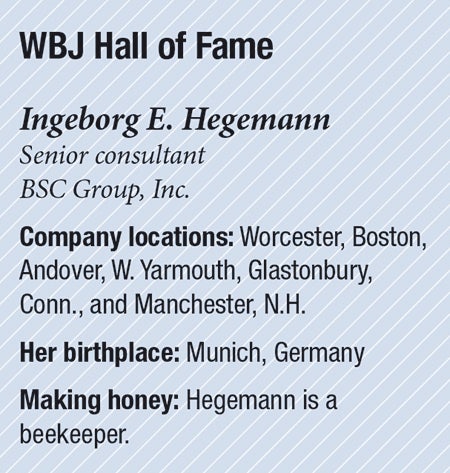For 40 years, Ingeborg E. Hegemann has devoted her life’s work to the conservation of wetlands as an ecological scientist storming the industry with her insight, leadership, professionalism and overall passion to the field.

“It’s a wonderful career. I drive around Massachusetts and see evidence of my work all over. It is kind of fun,” Hegemann said. “I remember monitoring the construction of Route 146 to the Mass Pike to minimize impact on the Blackstone River.”
The Route 146 project – a $16-million dollar project embarking in 1995 and ending in 2007 – is only but a small project in the Hegemann portfolio. Her dedication has shined on some of Massachusetts’ most notable revitalization projects, including the environmental restoration and permitting for municipal parks in Athol, Orange and Hudson. In Worcester, Hegemann has her hands in all projects near and dear to the Heart of the Commonwealth. With the restoration of Union Station, rehabilitation plan at the Auburn Mall, and improvements to the former South Worcester Industrial Park area, it is no surprise Hegemann played a vital role in the city planning for the Worcester Red Sox’s development of the new $160-million Polar Park.
Now, after starting a career in 1981 in ecological science, Hegemann is heading into retirement. During her time in the field, she ascended to be the principal of the 56-year-old Boston and Worcester firm BSC Group and just recently stepped down as chair of its board of directors. In addition to her many accomplishments in the field, she led diversity and family-friendly initiatives at BSC Group, which is now 30% female owned in a traditionally unbalanced industry.
“Ingeborg has blazed a trail for women in science and engineering, mentoring colleagues at both BSC Group and within the industry,” said Lee Curtis, vice president and principal at BSC Group. “Even 20 years ago, when BSC Groups’ Worcester team was in development, her leadership and reputation attracted women in the industry … Before formal policies and practices were in place, Ingeborg mentored and promoted women at BSC and through external organizations and volunteer work.”
Although the Hegemann portfolio is impressive, the nature of her work ethics and viewpoints surpass the expectations of any anticipated result, helping create more than a simple redevelopment of an area.
Hegemann creates a universal experience between life and its relation to its physical environment.
When contributing to economic revitalization projects, Hegemann hopes to achieve and maintain significant results with each project. For Hegemann, a revitalization project is the epitome of a golden opportunity.
“Redevelopment can be a blank slate for environmental improvement,” said Hegemann in an email interview. “For example, if redeveloping a closed big box store or strip mall, there are opportunities to improve stormwater quality before it runs off a site … consider putting in solar panels over the parking areas; improve pedestrian access; plant more trees; and integrate facilities to blend with neighborhoods.”
Hegemann has volunteered on the Stow Conservation Commission since 1993 and has been vital in raising the profile of the commission and educating its members on best practices, said Kathy Sferra, coordinator for the Stow Conservation Commission.
“Quiet leadership is the best way to describe Ingeborg.” said Sferra. “She doesn’t want the accolades. She has a quiet professionalism about her and works through setting examples … She is always willing to get her hands dirty and show other commissioners the reasonings behind her perspective. One thing that stands out about Ingeborg is how she combines science and the understanding of regulations and the fairness of applicants.”
Hegemann’s foresees the environmental impact on both the wetlands and that of human interaction.
Vivid, precise and outspoken, Hegemann has created a lasting impact on more than just the ecological makeup of Massachusetts.
At BSC Group, Hegemann formed a diversity and inclusion committee to promote dialogues on opportunities for women, people of color, and other historically marginalized communities.
“The work environment can be a complicated place, for so many reasons; but differentiating because of gender and race is something that can and has to be repeatedly evaluated. Promoting women and minorities in science needs to start early – in pre-school with play, in school with exposure to the fascination of nature, and professionally by opportunity,” said Hegemann.
Reflecting on the importance of gender and race representation in the fields of science, Hegemann remembers how fortunate she was in her graduate school to include a good number of women and how slightly naive she was about how women were treated differently.
“I was happy. I was outdoors a fair amount, in wetlands, and getting paid for it. It was a while before I realized that I needed to be more outspoken and, as I grew, to support women professionally, technically, and to be more responsive to individual situations,” she said.
This dedication helped create a unique Worcester office for BSC Group, Curtis said.
“As we enter 2021, BSC’s Worcester Office and Ecological Team has grown significantly and remains heavily influenced by female leadership and women in technical positions,” she said.

